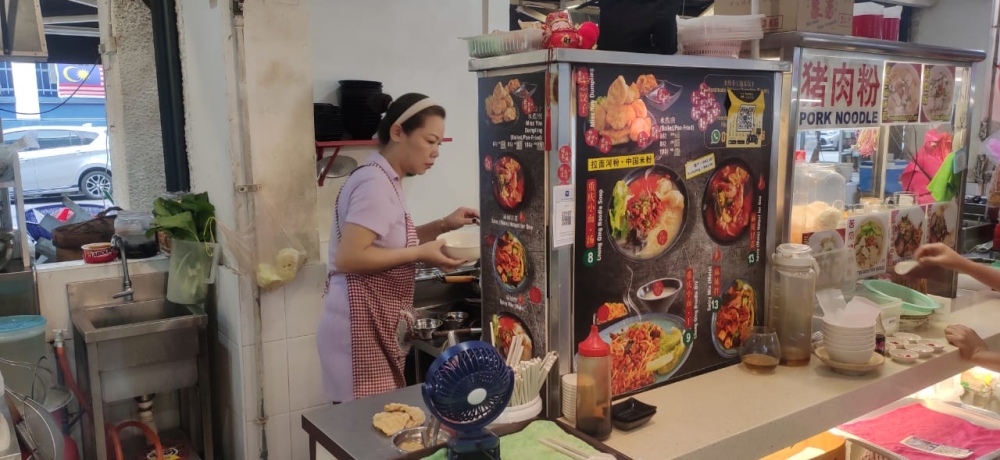KUALA LUMPUR, Sept 2 — Manning a hawker stall in Bandar Baru Sri Petaling here, Liaoning native Jin Fu cooks up her signature zhajiangmian — a noodle dish consisting of thick wheat noodles topped with a fermented soybean-based sauce — for her regulars.
Hailing from north-east China, Jin who came to Malaysia five years ago, said she has no intention of returning to her birth country.
“When I first came to Malaysia, it was at the request of my sister who needed someone to look after her children.
“In between, I started my own food business here. Now that I am here, I do not feel like going back,” the 52-year-old told Malay Mail.
The number of Chinese citizens who have made Malaysia their new home has almost doubled in the last three years, driven largely by an influx of students and new investors.
Jin is among the few who chose to relocate from the middle kingdom prior to the Covid-19 pandemic, and said there are several reasons why she and her countrymen chose to make Malaysia their new home.

“Well, one of the main reasons is Malaysia’s warm climate. From where I am from, it is very cold.
“Secondly, life in Malaysia is relatively simple and non-complicated. It is very easy for outsiders to co-exist and our common language is already understood by the locals,” she explained, adding that Malaysia is also peaceful compared to its regional neighbours.
Adding that she has settled in for good, Jin said she and other Liaoning natives have even formed a community to celebrate one of the most important holidays in Chinese culture — the Spring Festival.
“There is no reason for me to go home since both of my parents have passed on. Maybe the occasional visits to see our relatives that is all,” she said.
As China’s economic growth slows and the government imposes stricter business regulations, Chinese citizens are increasingly seeking new opportunities abroad where middle-class families are looking at South-east Asia as a more affordable option and in particular, Malaysia, a long-established home to the Chinese diaspora.
Jin said a lot of youths in China today find it a challenge to continue living in their homeland due to the intense competition and high costs there.
She noted that many middle-class Chinese citizens are seeking greener pastures overseas.
Affordable education
Han Xiaoming from Hebei province said she came to Malaysia with her family after her 15-year-old daughter was enrolled at an international school here about a year ago.
She and her husband run a restaurant serving Hebei home-styled cuisines from a variety of noodle dishes and Chinese snacks at in Kuchai Lama here.
“While my daughter finishes her studies, we opened up a small business here and will probably return to China when she finishes college,” she told Malay Mail.

Unlike Jin who came to Malaysia because of the weather, Han said she was only in Malaysia for the sake of her child who has expressed her wish to further her tertiary studies here after graduating.
“Foremost, the prices of enrolment here are reasonable and similar to those of China as compared to Europe or the Americas.
“On the other hand, our lives here are much simpler and our business affords us the lifestyle and education I want to provide for my daughter,” she said.
Han said what she loves most about Malaysia is how vastly different the tertiary education institutions here are from those in China.
“In China for example, of about 10,000 applicants, maybe one tenth is only able to secure admission into their desired universities,” she added.
She believes some Chinese citizens are lured to emigrate here because Malaysia has ample opportunities and Malaysians have a more easygoing approach towards life .
“In China, all you observe around are people; so competitiveness and pressure is tremendous.
“Here, the development opportunities are far greater than in China but for myself it is because of my child’s education, yet there are still some who are here to earn a living as well.
“This is very obvious. Surely if they possessed no high expectations in life, they would not have left their home behind, right?” she said.
‘Heaven for entrepreneurs’
On Xiaohongshu — a Shanghai-based social media and e-commerce platform with over 450 million registered users in countries with sizeable Chinese diaspora populations — one would find numerous postings by Chinese citizens on why Malaysia is a sought-after destination.
A blogger who goes by the name GiGi said Malaysia is a regional “heaven for entrepreneurs” if one is willing to work hard for it.
“A lot of people have asked me whether I regretted coming to Malaysia or if I am wasting my time here.
“I am telling you I am feeling a sense of contentment and I have never regretted coming to Malaysia. I consider Malaysia as my second home,” the 30-year-old Hangzhou native said in one of her vlogs narrating her experience here.
She said that in China, there are many misconceptions that Malaysia is poor or backwards.
But those who have travelled here have found Malaysia attractive, she said, noting that there are many similarities between their cultures and languages.
“This has lowered the degree of adaptability and made their lives easier,” GiGi said.
She added that other reasons include the overt friendliness displayed by Malaysians and the various types of cuisines available.



















